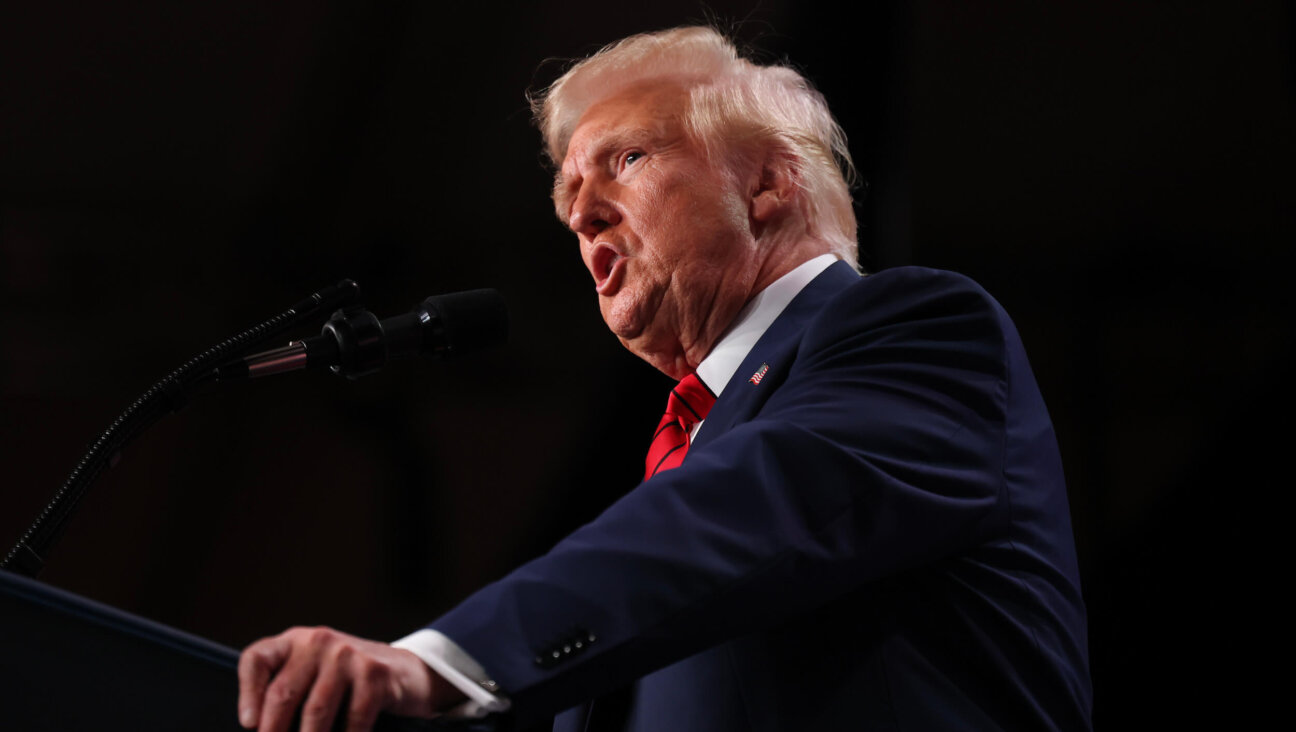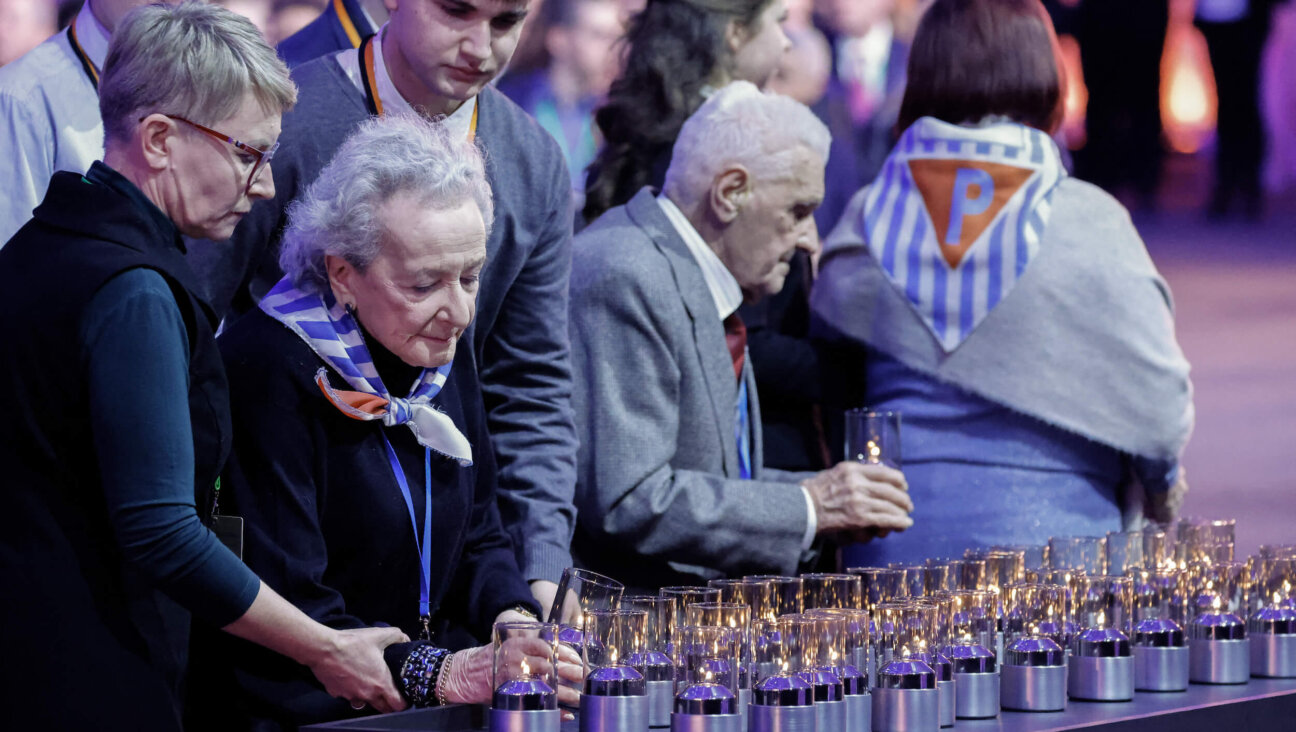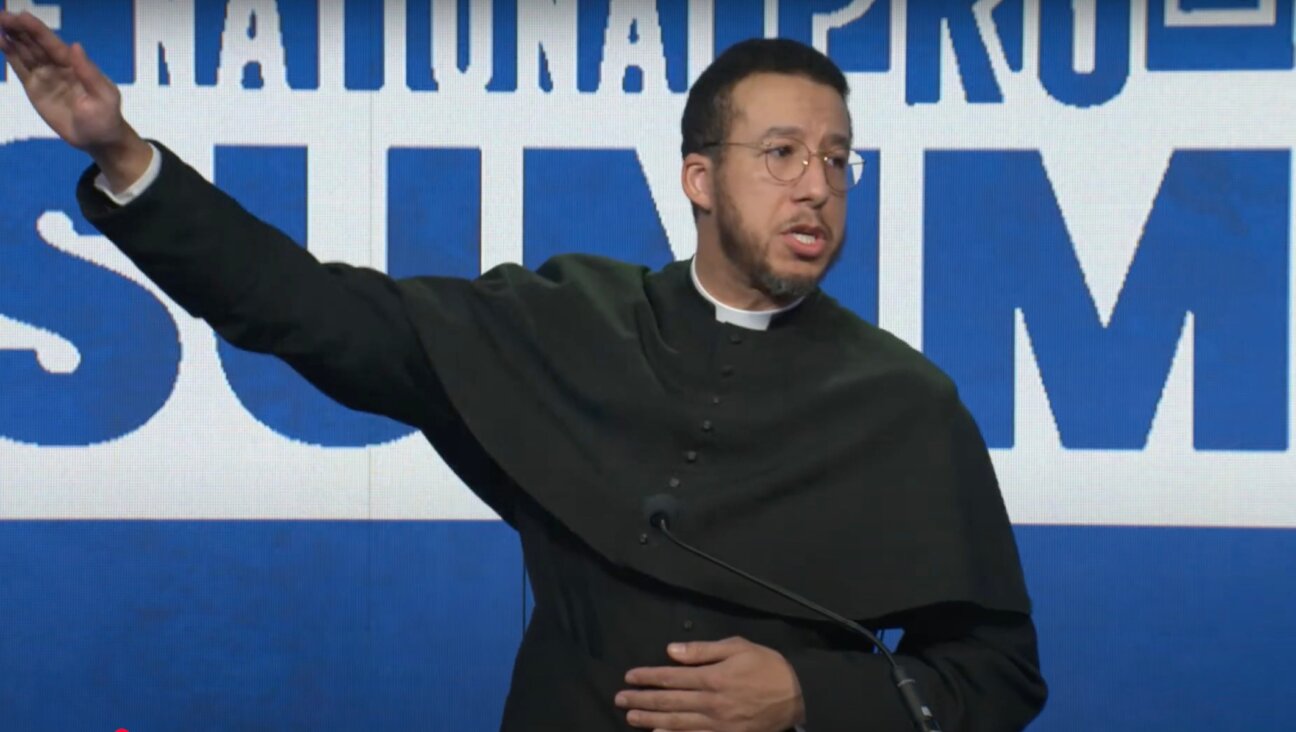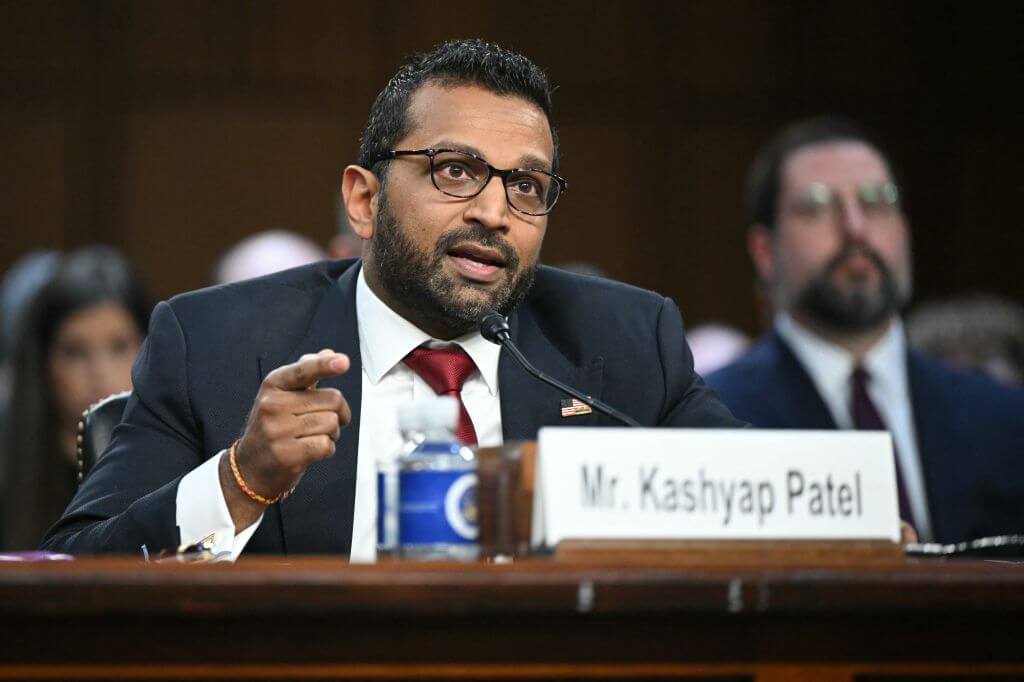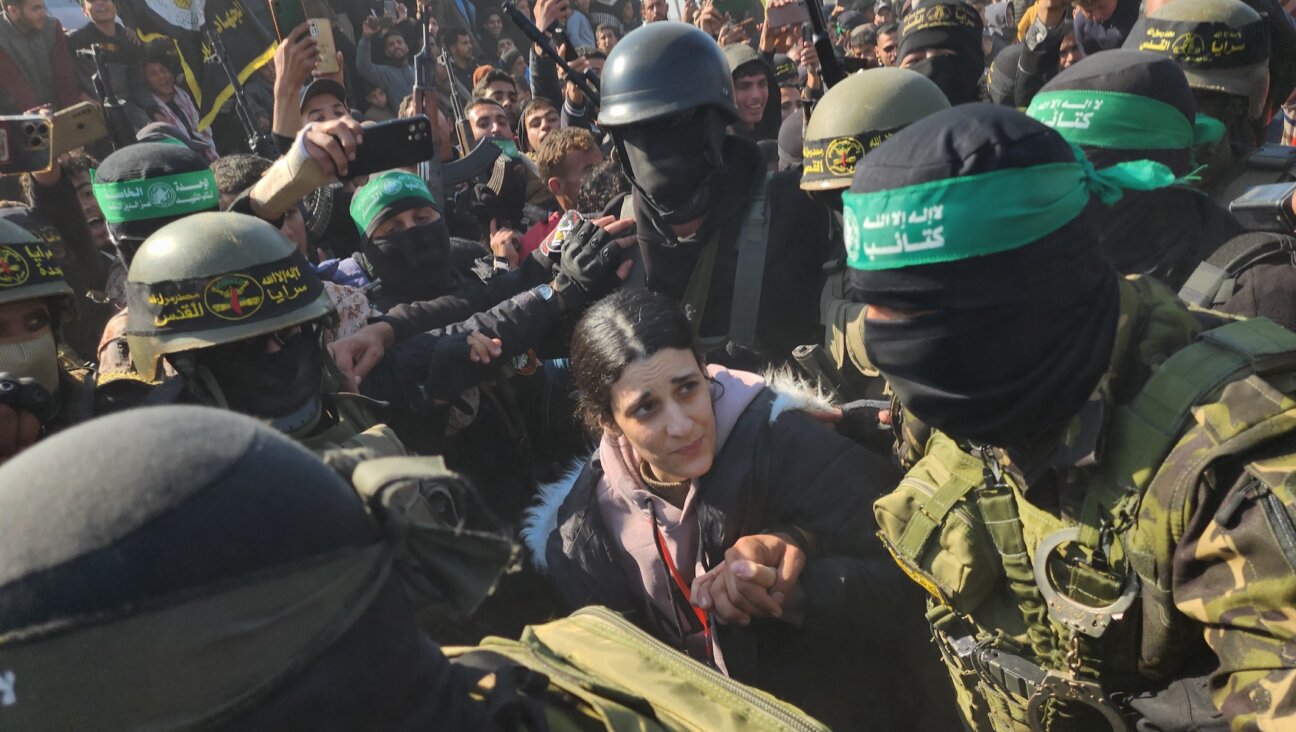Anti-Israel demonstrations are ruining Black Lives Matter

A young man in an AEPi kipa confronts a pro-Palestine protester at anti-annexation rally July 1 in Los Angeles. Image by Louis Keene
It is perhaps less than shocking that this season of our discontent gave way to a Day of Rage, a term used across the Arab world to denote a popular uprising. July 1 was devoted to an expression of Palestinian rage, with demonstrations erupting across the U.S. against “Israeli annexation, racism, and repression.” The date was no accident, a purported deadline for a decision on annexation which didn’t, however, ultimately manifest.
The protestors drew a comparison between the Black Lives Matter movement engulfing the U.S. and the plight of Palestinians in Israel and the occupied territories. And some may see this convergence as cause for celebration, a linkage of two struggles that promises to bring the oppressed closer and the oppressors lower.
Sheer, unabashed incitement. pic.twitter.com/lEkdQCm3Kl
— Tali Goldsheft (@TaliGoldsheft) July 1, 2020
But in fact, what yesterday’s Day of Rage shows is that the excesses of the revolution are always the counter-revolution’s best arguments. The surest way to shed support for Palestinians is to listen to the kind of rhetoric employed by their advocates. And the best way to dim consensus on civil rights here at home is to graft onto it a language of violence and hate that has done so much harm elsewhere.
For the Day of Rage included much more than anti-annexation rhetoric, veering predictably into anti-Israel and then anti-Jewish territory. Targeted by the San Diego protests were not just Israeli establishments, but a Jewish Federation building and multiple campus Hillels, in an effort perhaps to prove that the distinction between anti-Zionism and anti-Semitism is exceedingly porous and mostly fictious.
I have received screenshots and internal documents showing that the anti-Israel protests tomorrow in San Diego will consist people in cars driving around to harass Jewish spaces. UCSD Hillel, SDSU Hillel and the Anti-Defamation League are in the list, among others. pic.twitter.com/m5i6KfwXZF
— Dylan Meisner (@DylMeisner) July 1, 2020
Meanwhile, in Washington, D.C., the city where Lincoln’s Second Inaugural Address is inscribed in marble and Dr. Martin Luther King’s rhetoric still soars, marchers chose an infelicitous turn of phrase to chant: “Israel, we know you, you murder children too.” It was nothing short of a blood libel, straight out of the Middle Ages — immediately followed by “Black Lives Matter,” contaminating the call for justice by making it a package deal with a moral abomination.
It was only a matter of time before the DC protests turned anti-Semitic. pic.twitter.com/YTbwwGuOYh
— Nic Rowan (@NicXTempore) July 1, 2020
The slippage from Black Lives Matter to anti-Zionism was not unique to the Day of Rage; a Juneteenth rally promoted by Linda Sarsour’s organization was “open to all, minus cops & Zionists,” linking the two as morally odious categories worthy of exclusion (this is how slurs get created in real time). Again and again we have seen the logic of the most extreme forms of Palestinian rhetoric weaving themselves into the language of civil rights protests with alarming seamlessness.
This phenomenon was on steroids in New York’s Day of Rage. “When I saw that precinct burn, I thought we were closer to Palestine,” a protest leader chanted in Bay Ridge yesterday. “When I see an NYPD cop car burn, I say we are waking up revolutionary consciousness.”
“The police that are around us are an impediment to the liberation of Palestine!” Chanted another protestor.
“The misinformation spreads like syphilis, from the rotten extremities to the softening brain.”https://t.co/kpZep80Y9v pic.twitter.com/2oQa5Z4kL1
— Tali Goldsheft (@TaliGoldsheft) July 1, 2020
These quotes see violence against police in the U.S. as linked to violence against Israeli soldiers, a fallacy that undermines rather than strengthens both movements by the comparison. Immolating police cars may bring us closer to Palestine, but it will take us farther from what America must be; a movement that burns police cars will soon scorch its own ideals, and the inferno will consume indiscriminately.
But the extremism revealed here, which alienates all but the super-converted, was not limited to arson attacks against the police. People who showed up to the Day of Rage because they are broadly sympathetic to a negotiated peace between Israel and the Palestinians, horrified by annexation, and repulsed by Netanyahu, would have found nothing but a similarly unpalatable extremism on offer when it comes to the Middle East.
“We don’t wanna just go back to our homes in Gaza and the West Bank. We want all of it!” a woman chanted. “Genocide since 1948! We don’t want your two states!”
“We don’t wanna go just back to our homes in Gaza and the West Bank. We want all of it…we don’t want your two states.”
A taste of today’s #DayofRage in Brooklyn.
Additional chants from today include the genocidal “From the river to the sea” and “Intifada, intifada.” pic.twitter.com/DeUUZ6x44I
— Tali Goldsheft (@TaliGoldsheft) July 1, 2020
The protestors demanded an end to Israel, not a negotiated solution. They view Palestinian liberation as demanding the liquidation of the Israeli State. And they see compromise as the unlovely handmaiden to full scale conflict and ethnic cleansing. The ideals they chant live in the barrel of a gun.
Anti-Israel rhetoric will ruin chants for justice in the U.S. if they are allowed to infiltrate. It is imperative that those invested in this movement call out the hate when it appears under their banner. Weaponized Intersectionality has opened the door for the incitement, militarism, rejectionism and violence from half a world away to merge into our politics. It will be a disaster if it is allowed to take over.
It is the unpopular and awkward job of American Jews to make this case because rage never stays theoretical for very long, and the kind unleashed yesterday was poison to both reform and liberal democracy. We bring this up not out of self-interest, although it is also that. It is because an alliance with rage will only bring pain.
American Jews are a bridge between struggles here and in the Middle East, and the commuting of the worst tropes from there to here will be visible to us first. We have a responsibility to warn.
Ari Hoffman is a contributing columnist at the Forward, where he writes about politics and culture. His writing has also appeared in The Wall Street Journal, Tablet Magazine, The New York Observer, Newsweek, Mosaic Magazine, The Jerusalem Post, The Times of Israel, and The Tel Aviv Review of Books. He holds a Ph.D. in English Literature from Harvard and a law degree from Stanford.
A message from our Publisher & CEO Rachel Fishman Feddersen

I hope you appreciated this article. Before you go, I’d like to ask you to please support the Forward’s award-winning, nonprofit journalism so that we can be prepared for whatever news 2025 brings.
At a time when other newsrooms are closing or cutting back, the Forward has removed its paywall and invested additional resources to report on the ground from Israel and around the U.S. on the impact of the war, rising antisemitism and polarized discourse.
Readers like you make it all possible. Support our work by becoming a Forward Member and connect with our journalism and your community.
— Rachel Fishman Feddersen, Publisher and CEO









